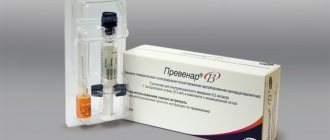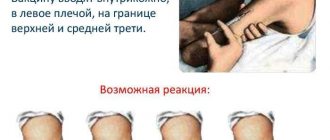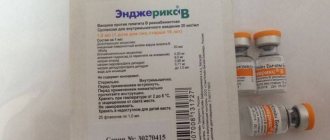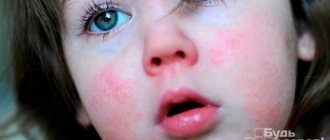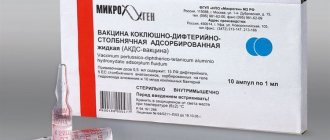Viral hepatitis is a disease in which inflammation of the liver tissue occurs due to the penetration of viruses. These are unpredictable pathologies that threaten dangerous complications, including death. It is difficult to predict how a person will survive this infection and what the outcome will be. After all, it is known that after liver damage, the functionality of not only the digestive system, but also the entire body is disrupted.
Considering the complexity of treatment and the dangerous consequences of hepatitis, doctors strongly recommend vaccination. The first hepatitis vaccine must be given immediately after the birth of the child. However, many patients are interested in how safe the vaccine is and how it will affect their condition. This will be discussed in detail below.
The need for vaccination
Immunoprophylaxis is necessary for a person to acquire resistance to viruses even after contact with a source of infection. Most often, people are vaccinated against hepatitis B. This is due to the fact that hepatitis A is mild in 90% of cases, and after symptoms appear (nausea, loss of appetite, diarrhea, jaundice, etc.) it disappears completely. In addition, this disease does not provoke dangerous complications (chronic liver disease, cirrhosis), and after recovery the patient develops lifelong immunity.
Vaccination against hepatitis for newborns will help protect them from the terrible consequences of infection
There is no vaccine against hepatitis C. Therefore, when doctors talk about the hepatitis vaccine, they usually mean the vaccine against the hepatitis B virus (HBV).
Hepatitis B is often fatal. According to statistics, in about 15% of patients the infection becomes chronic, then it is accompanied by complications and ends in cirrhosis and liver cancer. That is why immunoprophylaxis is the only way to avoid serious consequences.
The hepatitis vaccine for newborns will help protect against hepatitis B.
Doctors highlight several reasons for early immunoprophylaxis:
Mechanism of hepatitis B infection
- The earlier HBV enters the body, the higher the likelihood that the infection will become chronic. For example, in people over 18 years of age this probability does not exceed 5%, and in patients under 6 years of age – 30%. After immunization, the body produces specific antibodies.
- HBV can exist for several minutes at a temperature of +100°; the pathogenic agent remains active even after repeated freezing at ˗20°. It is able to maintain vital activity at low pH levels (2.4).
- Hepatitis B is often complicated by type D infection, and the patient develops cirrhosis.
- The main route of HBV infection is parenteral (through the blood). That is, a patient can become infected during surgery, a blood test, a visit to the dentist, or a beauty salon (manicure, piercing, tattoos). And after immunoprophylaxis, this risk is quite low.
- There is a possibility of infection of the child during childbirth (if the mother is a carrier of the virus).
- Hepatitis B often occurs without characteristic signs, so the patient is not even aware of his condition.
- Even if a person becomes infected after vaccination, the infection will be much easier, and there will be no dangerous complications.
That is why the first vaccination against hepatitis is recommended to be carried out within 12 hours after birth (in the absence of contraindications).
Complications
It is unlikely that such a virus passes without a trace. It has many complications and unpleasant consequences. For example, it is one of the main causes of hepatocellular cancer of the liver. The likelihood that hepatitis B will become chronic will be determined by the patient's age. Most likely, chronic infection will occur in children who become infected with this virus before the age of 6 years.
However, it is almost impossible to completely recover from this disease. The probability of completely getting rid of the virus is only 10%. At the same time, in 80% of cases, remission is achieved - a state when nothing bothers the patient. But we must remember that if a person wants to live a long life, it is important for him to always adhere to a strict diet that excludes salty, fried foods, tobacco and alcoholic products.
Hepatitis B vaccines
For immunoprophylaxis, domestic or foreign drugs are used that contain killed or weakened microorganisms. The main thing is that the medicine is registered in the country where you live. As a rule, immunization is carried out in clinics with domestic drugs. But if you wish, you can go to a medical center, where they will vaccinate using multicomponent or combined agents for a fee.
Domestic and foreign vaccines are used for immunization
Vaccines that are used in Russia:
- Recombinant yeast vaccine against hepatitis. This drug is produced by Combiotech Ltd. From Russia. This effective remedy is in no way inferior to foreign analogues. According to statistics, 68% of vaccinated people have a concentration of antibodies to HBV of 100 IU/l.
- Engerix B is a Belgian-made hepatitis vaccine. This is the first drug created using the recombinant method. It does not contain preservatives, has a high degree of purification, therefore it acts delicately and safely. Shows effectiveness in 95% of patients.
- Euvax B is a vaccine jointly produced by Korea and France. This drug contains a minimum of preservatives and has several quality certificates from WHO.
- Eber-Biovac is a vaccine that is produced in Russia and Cuba. The drug contains a minimum of preservatives and is used for mass vaccination.
- Shanvak B is an Indian product. It contains a low level of preservatives and is also used for mass immunoprophylaxis.
- HB-Vax-II is a drug jointly produced by the Netherlands and the USA. This high-quality vaccine does not contain preservatives; it can be used for vaccination of patients who are on hemodialysis (extrarenal blood purification).
- Regevak B is a drug originally from Russia based on the HBV virus. The vaccine has a low price and is protected by patents.
In addition to the vaccines described above, combination drugs are used for immunoprophylaxis that protect against hepatitis B, diphtheria, whooping cough and other diseases: Bubo-M, Tritanrix, Twinrix, Hep-A+B-in-VAK, Bubo-Kok.
Patients are interested in the question of how long the vaccine lasts. According to medical research, immunity after vaccination of an infant lasts for 18 to 22 years.
How do vaccines work?
Immunization against HBV is carried out with preparations (solutions) consisting of the HBsAg antigen. It is a component of the outer shell of HBV. It should be noted that the virus shell is very complex in composition and includes lipoproteins, proteins, and glycoproteins.
The role of HBsAg is to ensure the adsorption (absorption) of HBV by liver cells. Once in a comfortable environment, the virus begins to copy itself (that is, multiply), forming new DNA and proteins, which then penetrate the bloodstream.
This is how the infection spreads further. What is an antigen? This is a substance that can cause an immune response in the body, in other words, produce antibodies. It is they who will further protect people from viral attacks. This feature of HBV underlies almost all vaccines.
Killed (inactivated) or genetically modified antigens are injected into the patient’s blood. They are not capable of infecting the body, but are sufficient to trigger the production of antibodies. This is how immunity is formed.
The virus for vaccines is grown in yeast. This nutrient medium promotes rapid cell division. The resulting substance is separated from the yeast substrate by adding Al hydroxide and a preservative. The vaccine is ready.
Antibodies to HBV are produced 2 weeks after administration of the drug. It has been proven that 3 times of vaccination is quite enough to form long-term immunity. The most common today is immunoprophylaxis against hepatitis A and B.
Appointment for vaccination
After mild hepatitis B, specific antibodies (HbsAg) are detected in the patient’s body. These indicators appear 7 to 28 days after infection. If antibodies are still present 12 months after recovery, this indicates that hepatitis has become chronic or the patient is a carrier of the virus.
Vaccination is necessary for patients who frequently receive blood transfusions.
This is dangerous, since the disease may not manifest itself immediately, and a lot of time will pass before the patient is diagnosed. In addition, after a therapeutic course, HBV can live in the body for a long time. Based on this, the likelihood of infection is high, especially for a baby. Therefore, after contact with a sick person, you should get vaccinated.
Doctors identify a whole group of people who need vaccination against hepatitis:
- Vaccination is necessary for adults and children who often undergo blood transfusion (transfusion of blood products).
- You can get hepatitis if you live near an infected person.
- Vaccination is mandatory for people who have been in contact with the blood of a sick person.
- There is a high risk of infection among doctors who work with biological material.
- Immunoprophylaxis is necessary for patients before surgery if they have not been vaccinated before.
- Children need hepatitis vaccination after birth if they live in regions with a high rate of infection.
- Infants need vaccination if they had contraindications after birth or if their parents refused vaccination.
- Newborns whose mothers are HBV carriers should be vaccinated.
- Vaccination is mandatory for children in boarding schools.
- Immunoprophylaxis is necessary if a person is going to countries with a high incidence of hepatitis B.
Immunization will help avoid dangerous consequences of infection for patients at high risk.
About the routes of infection
In places where the virus is common, transmission usually occurs from mother to children during childbirth. Hepatitis is often transmitted to children in the early years of life. Hepatitis B develops through contact with infected biological fluids of other people - through contact with saliva, semen, and vaginal secretions. Hepatitis B is transmitted sexually. Moreover, it is 100 times easier to become infected with it than with HIV.
The virus is also transmitted in cases where people use the same needle or unsterile medical equipment. There is a possibility of infection from manicure supplies in a tattoo parlor. Although there is a moderate level of hepatitis B infection on the territory of the Russian Federation, the risk of infection for a Russian is approximately 20-60%.
Vaccination procedure
Hepatitis B is a dangerous disease, for the prevention of which there are 3 main immunization regimens.
Vaccination is carried out according to the standard, quick and emergency scheme
Vaccination schedule:
- Standard. According to this scheme, the drug is administered to the child for the first time after birth, then hepatitis vaccination is given every month, and the last one is given at 6 months. This is the most effective immunization schedule.
- Fast. The first vaccination is carried out after childbirth, the second hepatitis vaccine is administered after 1 month, the third - at 2 months, and the last - after 12 months. This regimen accelerates the development of immunity, so it is used for patients at risk of contracting hepatitis B.
- Extra. The first time the drug is administered after birth, the second time - after 7 days, the third vaccination against hepatitis is given on the 21st day, and the last - after 12 months. This schedule is most often used before surgery to quickly develop immunity or before traveling to countries with a high prevalence of hepatitis B.
In the absence of contraindications, the following scheme is possible - 0-1-6-12 months. After four vaccinations, immunity lasts for 18 years. Then immunization is carried out for medical reasons.
If the child is on hemodialysis, then he is administered the vaccine 4 times in the intervals between the procedure. In this case, the patient must regularly donate blood for analysis. The interval between the first two vaccinations should not be less than 4 weeks. Revaccination (maintenance of post-vaccination immunity) is carried out 8 weeks after the 4th vaccination.
Many patients are interested in the question of whether it is possible to be vaccinated against hepatitis B with different vaccines. According to doctors, all drugs in this series are interchangeable. So if such a need arises, then it is allowed.
In addition, the relevant question is whether the hepatitis B vaccine can be used simultaneously with other drugs. If the medicine is not initially combined, then this should not be done, as the likelihood of severe adverse reactions increases, and the effectiveness of the drug will decrease. According to the schedule, it is recommended to administer other drugs with the second hepatitis vaccine. For example, this is how Hepatitis B and Pantexim are combined, or polio, etc. Then you can use a combined drug, for example, Bubo-kok. It is prohibited to combine hepatitis with BCG.
If the vaccination period is not met, you must wait from 1 to 4 months before administering the second dose, and before the 3rd vaccination - from 4 to 18 months.
Cost of vaccines
In our country, adult vaccinators are vaccinated free of charge up to 55 years of age.
If paid immunoprophylaxis is required, the price of the vaccine (for 1 dose) will be:
- Regevak B (1.0 ml) – 200-335 rubles;
- Combiotech (adult 1.0 ml) – 550 rub.;
- Engerix (Britain) -220-330 rubles;
- Biovac – 170-230 rubles;
- Havrix 1440 (1.0 ml) – 1850 rub.
We should not forget about paid preventive examination. Its price in private clinics is 1000-1100 rubles.
As a result, the cost of the initial procedure will cost 1300-3000 rubles.
Composition and use of the vaccine
The hepatitis vaccine contains the following components:
- A fragment of the capsid (outer protein shell) of the HBV virus. Its concentration in the children's vaccine is 10 mcg, and in the adult vaccine - 20 mcg.
- Aluminum hydroxide.
- Preservative.
- Yeast proteins (trace concentration).
Children are vaccinated in the thigh, and adults are vaccinated in the arm.
Some medications do not contain preservatives.
The dosage of the vaccine is 0.5 or 1 ml, which contain a certain amount of HBV envelope protein. A single dose for patients under 19 years of age is 0.5 ml, for older patients – 1 ml. The vaccine dose for children on hemodialysis is 1 ml, and for adults – 2 ml.
Young parents are interested in the question of where their children are vaccinated against hepatitis. For patients of the younger age category, the drug is administered intramuscularly into the anterolateral part of the thigh. This is due to the fact that when a reaction occurs in this area, it is easier to carry out the necessary manipulations. When the baby calms down, you can take him for a walk in the fresh air.
Adolescent and older patients who have not previously been immunized are also interested in where they will be vaccinated against hepatitis. The drug is injected into the deltoid muscle.
If a person has been ill or is a carrier of the infection, then vaccination does not need to be carried out. It won't bring much benefit, but it won't do any harm either.
Before using the drug, you should inspect the bottle; if after shaking there are no foreign impurities, then it can be used. In addition, you should pay attention to where the health worker stores the vaccine, as it is prohibited from freezing.
Post-vaccination reactions
The newest hepatitis vaccines are highly purified. As a result, they are so soft that they are even indicated for infants. Their effects are tolerated very easily by the body.
The most common reaction to hepatitis vaccine is local. It occurs at the site where the injection was given. Elevated body temperature, weakness and malaise are much less common. But such reactions are considered completely normal, they pass quickly, after two days. They are not treated, they disappear on their own.
It should be noted that cases of allergy to the vaccine in the form of anaphylactic shock are rare. Chance: 1 in 600,000.
Rules of conduct before and after vaccination
To make the procedure easier, the patient should follow the following recommendations:
- Before vaccination, it is necessary to donate blood and urine for analysis. This is necessary to determine the patient's health status. After all, hepatitis B does not always manifest itself with characteristic symptoms.
- On the eve of immunization (2 days before) and after vaccination (4 days), it is not recommended to be in crowded places. You should not visit shops, school, swim in ponds, etc. This is important, since after vaccination the patient becomes vulnerable to viral attacks.
- Many patients are concerned about whether the hepatitis vaccine can be wetted. Home bathing after hepatitis vaccination is not prohibited. Itching is more likely to come from sweat rather than water. However, it is forbidden to wet the injection site with water from open reservoirs, as this risks infecting the area.
- Before the procedure, you should visit a doctor. He will measure your temperature, examine your throat, lymph nodes, and listen to your breathing and heartbeat.
- Vaccination is contraindicated if the child is not feeling well. If the baby has a headache, stomach ache or coughs, it is better to wait 2-3 days.
- Patients are interested in the question of whether it is possible to go for a walk after being vaccinated against hepatitis. If the weather is good, then you can, but on a rainy, cold day it is better to postpone the walk.
- Adult patients should remember that hepatitis vaccination and alcohol are incompatible concepts. In addition, you should avoid spicy foods before and after the procedure.
- 7 days before and after vaccination, it is forbidden to supplement the diet of young patients with new products. This is because children sometimes become allergic to the product and not the vaccine.
If a child has a cold, it is better to refuse vaccination for 2–3 days.
The patient should be monitored by a health care worker for half an hour after the vaccine is administered. This is necessary, since there is a possibility of a severe reaction, and the doctor will be able to provide first aid to the victim.
Efficiency
For those who do not know at what age they are vaccinated against hepatitis, it is extremely important to understand that this type of vaccination must be carried out. It is effective and safe. In countries where approximately 15% of children suffered from this disease, after the introduction of vaccination, their number dropped to 1%.
After scientists decided at what age to get vaccinated against hepatitis and began to implement their plan, mortality due to this disease decreased by 90%. In addition, the likelihood that newborns will become infected with this infection from mothers (carriers of the virus) has decreased by 20 times.
When figuring out which hepatitis children are vaccinated against, it should be taken into account that, according to research, such a vaccine essentially became the “first anti-cancer vaccine.” After all, it was often hepatitis that provoked liver cancer.
Reaction to vaccination, precautions
Vaccination against hepatitis is prohibited for the following diseases and conditions:
- Acute infections or exacerbation of chronic diseases. Vaccination is carried out when the patient recovers.
- The child's body weight is less than 2 kg. The drug is administered after weight normalization.
- The patient underwent chemotherapy. After using potent drugs, the immune system is greatly weakened, then vaccination is postponed for several months.
- Immunodeficiencies (oncological diseases, AIDS, pregnancy, blood cancer).
- Severe allergy to vaccine components.
The most common reaction to vaccination is redness and thickening.
These are the main contraindications for vaccination.
Modern drugs are of high quality, so complications after their use rarely occur.
Side effects of hepatitis vaccine:
- If you are allergic to vaccine components, you may feel unwell, have a rash at the injection site, or have angioedema.
- General complications are extremely rare: weakness, fever, nausea, abdominal pain, arthralgia. If the temperature after vaccination against hepatitis rises above 37.3°C, nausea and vomiting are present, then you need to consult a doctor, since most likely this is not a reaction to the drug.
- Local side effects occur more often: redness at the injection site, thickening, pain when pressed.
As a rule, patients feel well after immunoprophylaxis, and the above-described manifestations rarely occur. Negative reactions occur if the rules for transporting the drug are not followed or the patient violates the rules of behavior before and after vaccination. A reaction to a hepatitis vaccine may appear after the first injection, but after the second and third the person feels good.
The consequences of hepatitis vaccination in newborns and older patients are not as terrible as with chronic type B infection. Therefore, there is no need to doubt whether you should act after detecting HBV in the blood.
How to avoid side effects
Side effects after vaccination of a newborn against hepatitis are rarely detected and often go away on their own. This vaccination is considered absolutely safe. The most common reaction is redness of the skin in the injection area.
If the vaccine is administered incorrectly, undesirable reactions intensify. Parents need to make sure that the nurse in the vaccination room administers the injection correctly. It is done in the thigh, since this muscle is best developed in newborns. If the drug gets subcutaneously, the baby will develop a lump that will become inflamed. Therefore, it is important that immunization is carried out by a specialist.
Hepatitis immunization is prohibited for children who have recently had respiratory illnesses. The vaccine can be administered only after complete recovery.
Mandatory conditions for vaccination are:
- lack of temperature;
- no allergies;
- absence of infections in the acute stage.
Meningitis
If a newborn child has had meningitis, the vaccine is given no earlier than 6 months after recovery.
The likelihood of side effects in children is reduced if there are no contraindications to vaccination.
Pros and cons
Today, vaccination against hepatitis B for children, like everyone else, is not mandatory, so parents doubt whether it is needed at all. Before signing a waiver, they must weigh the pros and cons and make the only right decision. There are a number of reasons why all doctors recommend mandatory vaccination of children from a very early age against hepatitis B:
the spread of infection has recently acquired the character of an epidemic, so the risk of infection is very high, and it can only be reduced through vaccination; hepatitis B can become chronic, that is, it can give long-term, very severe complications in the form of cancer or cirrhosis of the liver, which leads to disability and death in childhood; a child infected with hepatitis becomes chronic; If you get vaccinated against hepatitis B, the chance of becoming infected still exists, but it is very low; Even if a vaccinated child is infected, the disease will be mild, and recovery will occur much faster and without any consequences for the baby’s health.
Many parents mistakenly believe that their children do not need a vaccine against hepatitis B, since they simply have no place to get infected: they are brought up in a prosperous family and do not use drugs. This is a fatal misconception.
Children may come into contact with someone else's blood, which may be a carrier of a dangerous virus, in a clinic, kindergarten, or on the street: a nurse may forget to put on new gloves when taking a blood test; a child may fight, hit himself, or someone might bite him; on the street, a child can pick up a used syringe and many other strange objects. No one is safe from infection.
So parents should understand that vaccination against viral hepatitis B is very useful and is necessary for all children from birth. It is not for nothing that she is listed as one of the first on the vaccination calendar.


